Godzilla Minus One
“As you all know, Tokyo again faces an unprecedented crisis. This time, a monster attack.”
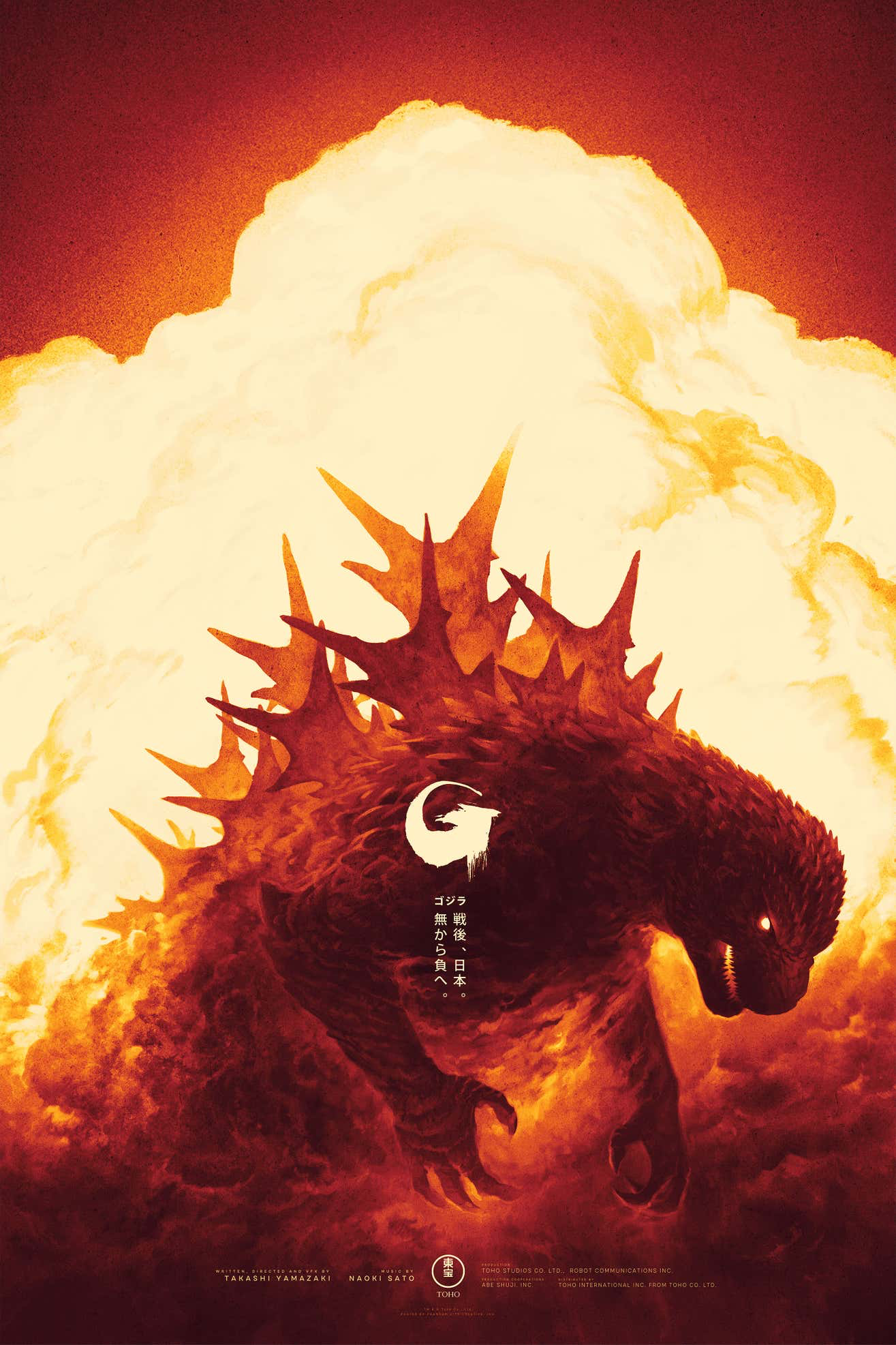
Set in a Japan that has yet to recover from the fallout of the Second World War, a new peril has emerged off the coast of Tokyo, a giant monster that will come to be known as Godzilla. Koichi Shikishima, a deserter traumatized by his first confrontation with Godzilla, sees this new fight as an opportunity to redeem himself for his actions during the war.
Godzilla is the oh-so familiar giant lizard monster, with a distinctive roar and a fiery “atomic breath” weapon, better known as a kaiju, a word that means “strange beast.” First debuting in the 1954 film Godzilla by Ishiro Honda, he is commonly regarded as the first kaiju movie, despite being at least somewhat inspired by the 1933 film King Kong. Known as the King of the Monsters, Godzilla has since become an international pop culture icon, appearing in films, tv shows, cartoons, novels, comics, and in video games, where he has faced down armies, aliens, robots, and even superheroes, not to mention a huge cast of other giant monsters, like the aforementioned King Kong.
The most widely accepted origin of the name Godzilla seems to be that producer Tomoyuki Tanaka named the monster after a “sturdy” Toho worker by the name of Shiro Amikura. Shiro had been “jokingly” dubbed Gujira, presumably by Tanaka, a portmanteau of the Japanese words for gorilla, due to his “burly” build, and whale, due to him allegedly liking whale meat. While this was confirmed by Tanaka, Kimi Honda, the late wife of the late Ishiro Hondo, claimed that this was just a fabrication, and that the name came as the result of “considerable” thought. I guess she was uncomfortable with the idea that the name was the result of bullying? Anyway, the name eventually became "Gojira,” meaning "God Incarnate,” which then went on to become Godzilla for overseas distribution.
…However the name Godzilla may have come about, one thing is for sure, it sounds like Tomoyuki Tanaka was a fucking dick.
Often portrayed as a kind of amphibious dinosaur-like creature, one who mostly resides in the ocean, after Hiroshima and Nagasaki, as well as the Lucky Dragon 5 incident, Godzilla is primarily considered to have been intended as a metaphor for the use of nuclear weapons. Some believe Godzilla was meant to be more of a metaphor for the United States, the "giant beast" who was awoken from its “slumber" that then went on to take a terrible vengeance on Japan, but this interpretation is nowhere near as prevalent. Sometimes, the Godzilla films seem to be a scold, addressing themes of Japan’s neglect of itself, or its ignorance of its past. Sometimes Godzilla is portrayed simply as a kind of natural disaster. Usually, Godzilla’s attacks are used to highlight the human condition, and our ability to persevere through great strife and hardship. Godzilla is often shown to be a threat to humanity, causing massive destruction every time he comes ashore, sometimes as the result of a deliberate attack, but sometimes as something more akin to a person stepping on an anthill on their way across a park. Other times, Godzilla has been shown to be a protector of humanity, a creature who appears in our darkest hour, to stand between us and whatever it is that threatens to destroy us. And sometimes, Godzilla is treated as more of an antihero, someone who doesn’t mind stomping on the humans himself, but boy oh boy, does he get upset when some other monster comes along and tries to stomp on the humans.
Whatever version you get, The King of the Monsters is 70 years old this year.
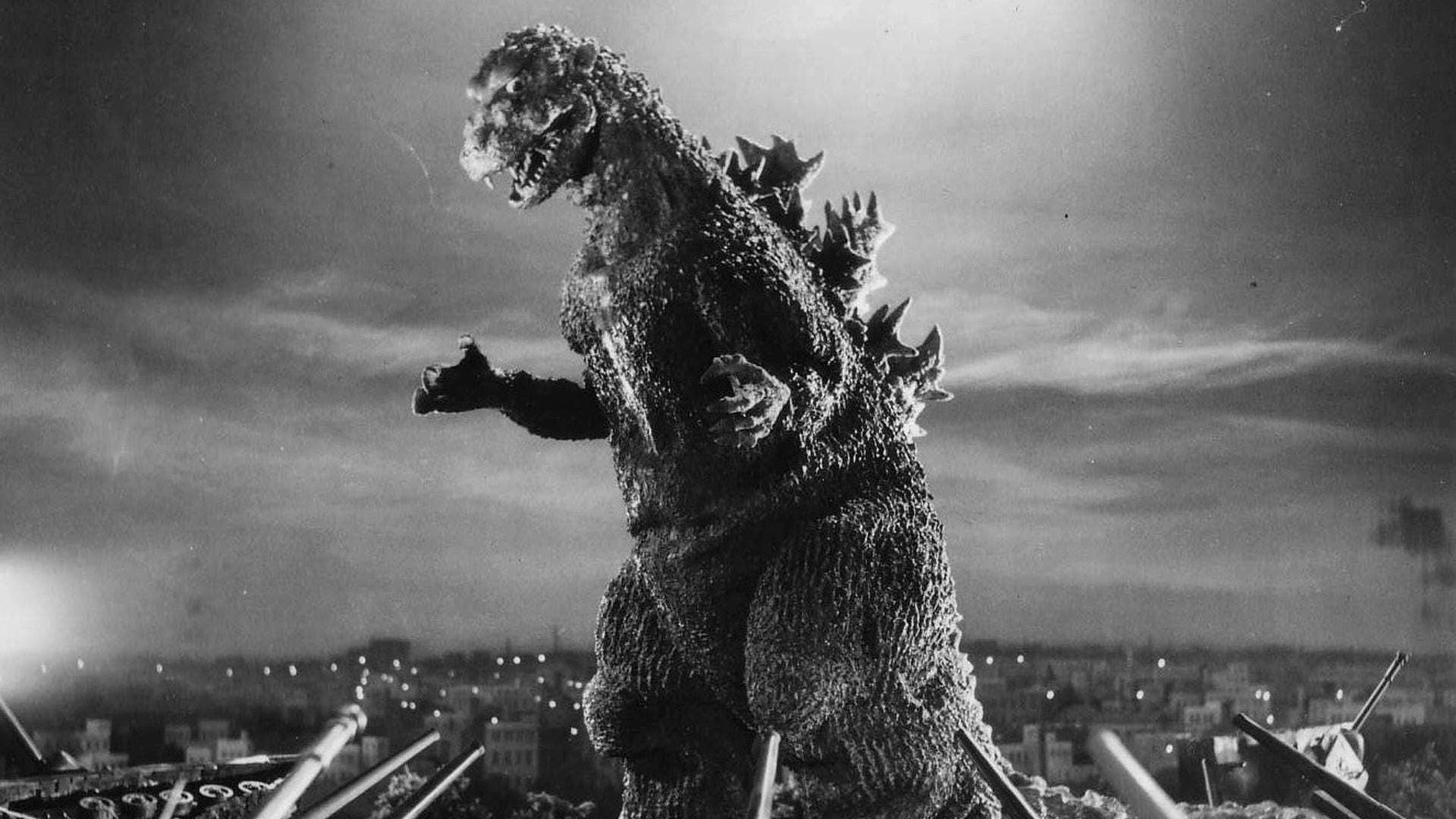
This particular film, Godzilla Minus One, was a big film for the franchise.
Made for a reported budget of $15 million, a shockingly small amount in the modern day world of big budget blockbusters, and then released to almost universal critical acclaim, not to mention a record-setting box-office run, Takashi Yamazaki’s Godzilla Minus One was the first Godzilla movie to win an Academy Award. Many people out there consider this film to not only be the best Godzilla movie of all time, but possibly the best film of 2023.
I don’t know if I’d agree with any of that exactly, as there were a few things that kind of bugged me about this film, but all that aside… it was definitely good.
I really enjoyed it.
The small budget is one of those things that a lot of people seized on as an opportunity to rail against the admittedly out-of-control budgets of a lot of the Hollywood studios’ big blockbuster films, especially when it comes to superhero films, taking a “look how amazing this film looks, and how little they had to spend to make it,” stance. And while this is definitely true, Godzilla Minus One looks amazing, and this alleged budget is definitely smaller in comparison to how much Hollywood studios spend in order to get products that often aren’t as good, the people who take this stance are generally insincere assholes and butthurt contrarian opportunists who, for some reason, refuse to simply say… “I dislike the majority of Hollywood big budget films,” or “I hate superhero films” and then move on. Instead, they spend too much time online, glomming onto any reason they can that they think they can use to paint the kinds of movies they hate as unassailably, irredeemably, and objectively bad, and not just bad in quality, but evil too, all so that they can then scream it into the void as often and as loudly as they can.
And you know that these people are insincere and unserious fuckholes, because very tellingly the one thing they always neglect to mention is the fact that the only way a production this size can have a budget this small… is by over-working and under-paying their staff.
There’s no other way.
Yamazaki said in an interview, “We really try to avoid long hours, but if you do, it’s a very welcoming environment in which to spend a few extra hours. Hopefully, in due time, VFX budget increases will allow for more improvements. I am looking forward to the day when we can pay creatives more.” Which really just sounds like the usual “we’re a family here” Boss-man horseshit, but whatta ya’gonna do, right? Boss makes a dollar, I make a dime, and that's why I poop on company time, right? Yamazaki went on to claim that he did everything possible to create a good working environment for the VFX team, such as renovating the office space, enlarging the kitchen, and even hiring a sushi chef, which I guess is Japan’s version of the American CEO announcing from their yacht that while there’s not going to be any raises again this year, they are planning on having a pizza party this Friday.

Now, understand, I’m not saying that Hollywood doesn’t do the same shit, they do. And I’m not saying that the effects weren’t amazing, they were. Godzilla Minus One definitely deserved that Oscar.
But it was also pretty obvious that much like the little smelly gaggle of contrarian buttholes in the filmhead community, even the Academy was more in love with the David vs Goliath story of a foreign film with a tiny budget taking on some Hollywood institutions for the big golden prize. They were definitely way more in love with that story then they were with the reports that the Japanese staff who made those amazing effects had been taken advantage of, and all for a few sad little picked-over pieces of nigiri still on the tray later that night to make up for them having to work overnight. And it certainly didn’t hurt that the foreign film in question was an arty Godzilla film that, unlike most Godzilla movies, was primarily interested in centering the human characters, instead of diving into the franchise’s weird lore.
And I’m not saying that the character work wasn’t well-done either, that the film wasn’t generally pretty well written, because for the most part, it was. It’s a good, fun movie. I’m just saying here, y’know…?
Anyway.
On the plus side, Godzilla Minus One was also a film that upset the White Supremacists and Christian Nationalists that are currently tearing apart our country with their Nazi bigot nonsense, as they almost immediately accused the film of being “woke.” I’m not exactly sure what it was in this particular film that triggered the little snowflakes, but it doesn’t matter. “Woke” is now the favorite pejorative of the White American bigot, after they had stolen the term from its African-American Vernacular English (AAVE) roots, where it was originally meant to indicate an alertness to racial prejudice and discrimination, and eventually expanded to encompass a much broader awareness of social inequalities like racial injustice, sexism, and a denial of LGBTQIA rights, but it has since been co-opted by bigots to mean “anything I don’t like and/or doesn’t center me as a white person.”
And with this being the case, there’s one thing you can rely on as always being true… If you ever hear a person complain that something is “woke” then you can rest assured that person is a fucking idiot and a huge bigot, and this is especially true if you hear a person complaining that Godzilla, a creature born from the horror of atomic fire and massive death, a wildly anti-war figure since its very inception, has somehow been turned “woke” by Hollywood.
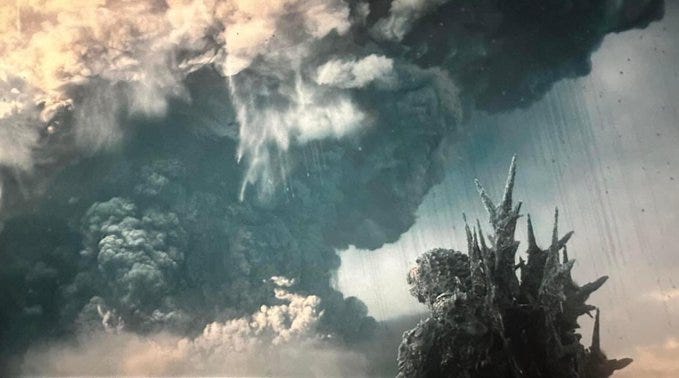
Godzilla Minus One is very obviously a movie about the people of Japan, and the atomic bombs that were dropped by the United States at the end of World War two—an event which leveled entire cities and murdered hundreds of thousands—and how the survivors then had to learn to live in the wake of that atomic fire.
So, with the horrors of the atom bomb front and center, this is a film that, much like Shin Godzilla, is about the perils of natural disasters, atomic power, and the failures of government bureaucracy, but it’s also a story of redemption, one that extolls the value of community, especially when the institutions of government abandon you.
In this film, the humans are naught but ants beneath the feet of an angry god, and Godzilla is a whirling maelstrom of death and destruction, a belligerent beast on an unstoppable rampage of wrath and wreckage, bringing with him a furious frenzy of cacophonous catastrophe, a titanic typhoon of deliberate devastation. Here, Godzilla is a pale horse, and the name that sat upon him is Death, and Hell has followed with him to Japan, so this is also the story of what it’s like to be helpless before such raw and unstoppable power, and to have your life battered and smashed to pieces by forces beyond your control.
Unfortunately, despite already having a premise that is very ripe for drama, there’s also an overly simplified and contrived story of patriotism and nationalism too, one that ignores a far more complex history.
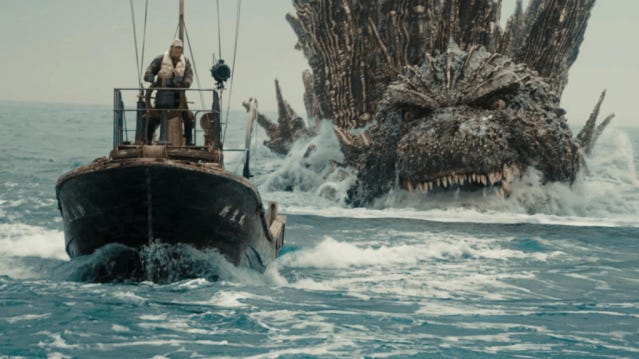
Set in 1946, well into the American Occupation of Japan following World War 2—although, you’d never know it from watching the film—Godzilla Minus One focuses on a group of resigned-in-defeat veterans as they struggle to find their place in a broken country trying to pick up the pieces. But when Godzilla shows up and starts wrecking shop, and the government proves unequal to the task of stopping him, the vets must rally together to vanquish the massive kaiju.
Suffering from a debilitating case of PTSD—due to the deaths that resulted when he froze and was unable to pull the trigger on Godzilla upon their first encounter during the war—disgraced kamikaze pilot Koichi Shikishima returns home to Tokyo, and discovers that his loved ones are dead, and his home and city are all but destroyed. In the rubble, he meets a woman, Noriko Ōishi, whose parents died in the bombing, and an orphaned baby, Akiko, whom Noriko rescued. Motivated by his overwhelming guilt to make amends for his cowardice, Shikishima takes the most dangerous job available in Japan’s effort to rebuild… sailing aboard a minesweeper and clearing the thousands of unexploded mines laid in the waters around the country.
Throughout this whole first act set-up, the film really highlights Shikishima’s “spiritual decline,” the scars he carries from war, and how it’s preventing him from moving on and living happily with his new found family. Depression, PTSD, its clear that Shikishima is suffering from it all, I get it, and obviously therapy isn’t an option back in the day, but instead the film seems to prioritize reinvigorating Shikishima’s patriotic fervor, to relight his passion, his spirit, as the film seems to feel that this nationalist passion is the main key to fucking up Godzilla. So, as a result, every other character in the film, from Noriko, to baby Akiko, to all his little war vet buddies on the minesweeper, everyone, are all bent towards encouraging Shikishima to develop a stiff upper lip, and to give him a reason to fight both the giant monster that wrecking havoc on his country… and the giant monster that is wrecking havoc on his heart.
And it’s a good thing too, because meanwhile, Godzilla, already huge and bad-ass, is mutated by the U.S. nuclear tests at Bikini Atoll, growing even bigger and even more bad-ass, and soon enough, the Big G is sinking battleships and any other ship in his way, as he heads straight for Japan.
In the single acknowledgement of the Occupation, the U.S. is like: “Sorry, but this really sounds like a you-problem, guys. Plus, we don’t want to upset Ivan by bringing any warships too near to them, so… good luck?” Then, MacArthur approves a few Japanese Imperial Navy warships to be brought out of mothballs in order for Japan to take on Godzilla. But in an effort to avoid panic, the Japanese government decides to keep the whole “a giant lizard is on the way to stomp on us” thing under wraps, which proves to be a poor decision on the day that Godzilla wades ashore at Tokyo, catching the entire city unaware.
And that’s when the horns kick in for the familiar Godzilla theme…
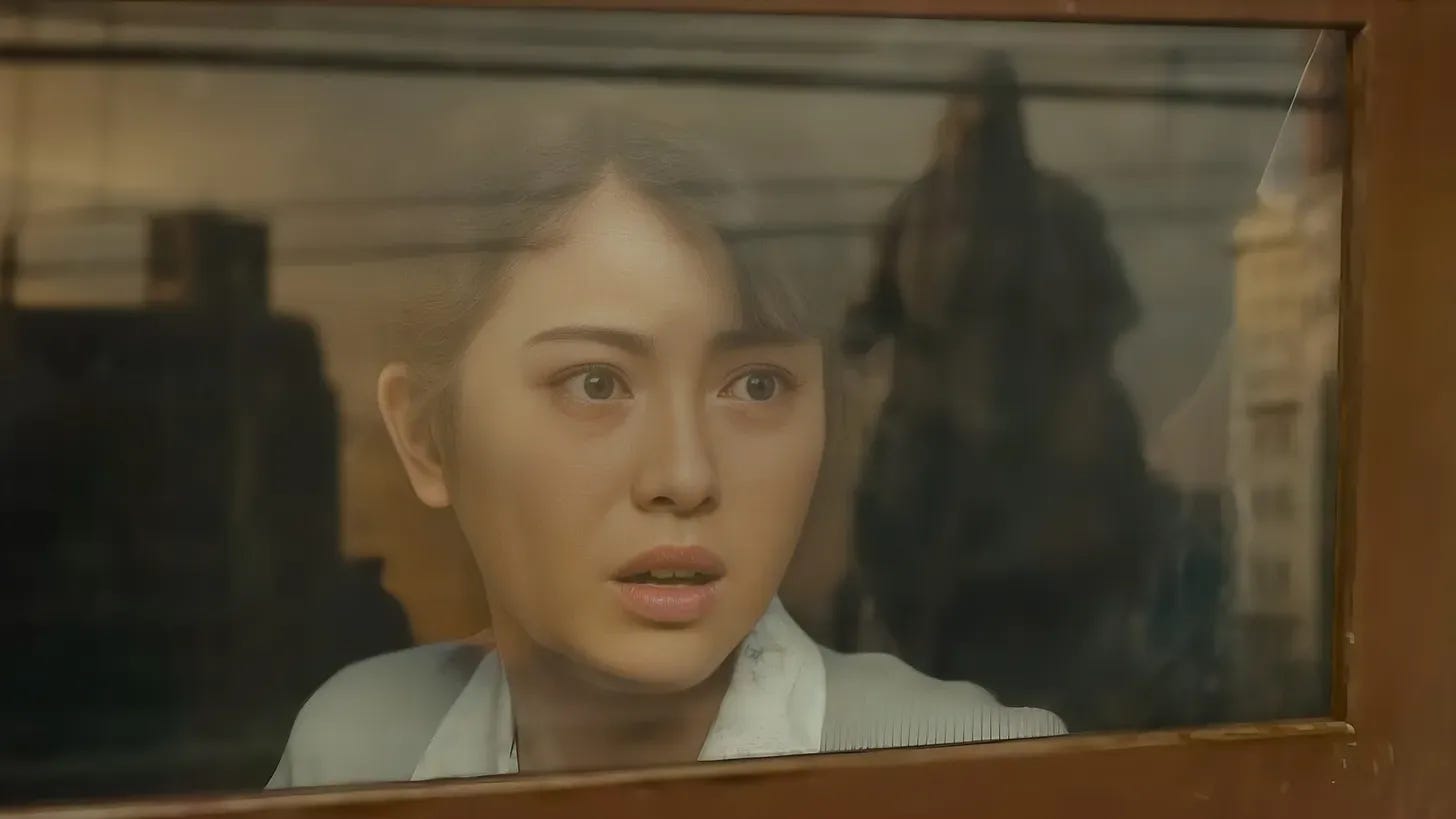
After that, just like every time, Japan learns to their great regret that King of the Monsters is not one with whom to fuck. And one thing is definitely for sure here, the power build-up to Godzilla unleashing his atomic breath on Tokyo has got to be the greatest version yet. Just amazing. It’s an incredible sequence.
So, after trouble comes a’knocking, and the Japanese government whiffs big time, something that the citizens of Tokyo pay one hell of a price for, all the veterans, all these defeated and disgraced former soldiers, realize that they must unsheathe their swords one last time, and ride out to face down the beast, where they will either die nobly on the battlefield, or restore honor back to the country of Japan. This means that there’s a whole bunch of manly crying, some much-needed forgiveness, and a ton of very determinedly stated resolve, as a big silly plan is enacted to stop Godzilla. The plan goes wrong in all the right ways, and in the end, everyone who is still alive walks away with their pride and honor restored.
I really appreciated how, for as straight-forward as this film is, with it’s only real weirdness of course being the big, green, and scaly metaphor stomping on Tokyo, at the end of the film, it’s shown that even though Noriko survived the rampaging kaiju’s atomic blast, there was this little black mark on her neck. This black mark is a sign of being infected with Godzilla cells, or G-cells. Lore-wise, G-cells play a major role in creating two of Godzilla's villains, Biollante and SpaceGodzilla.
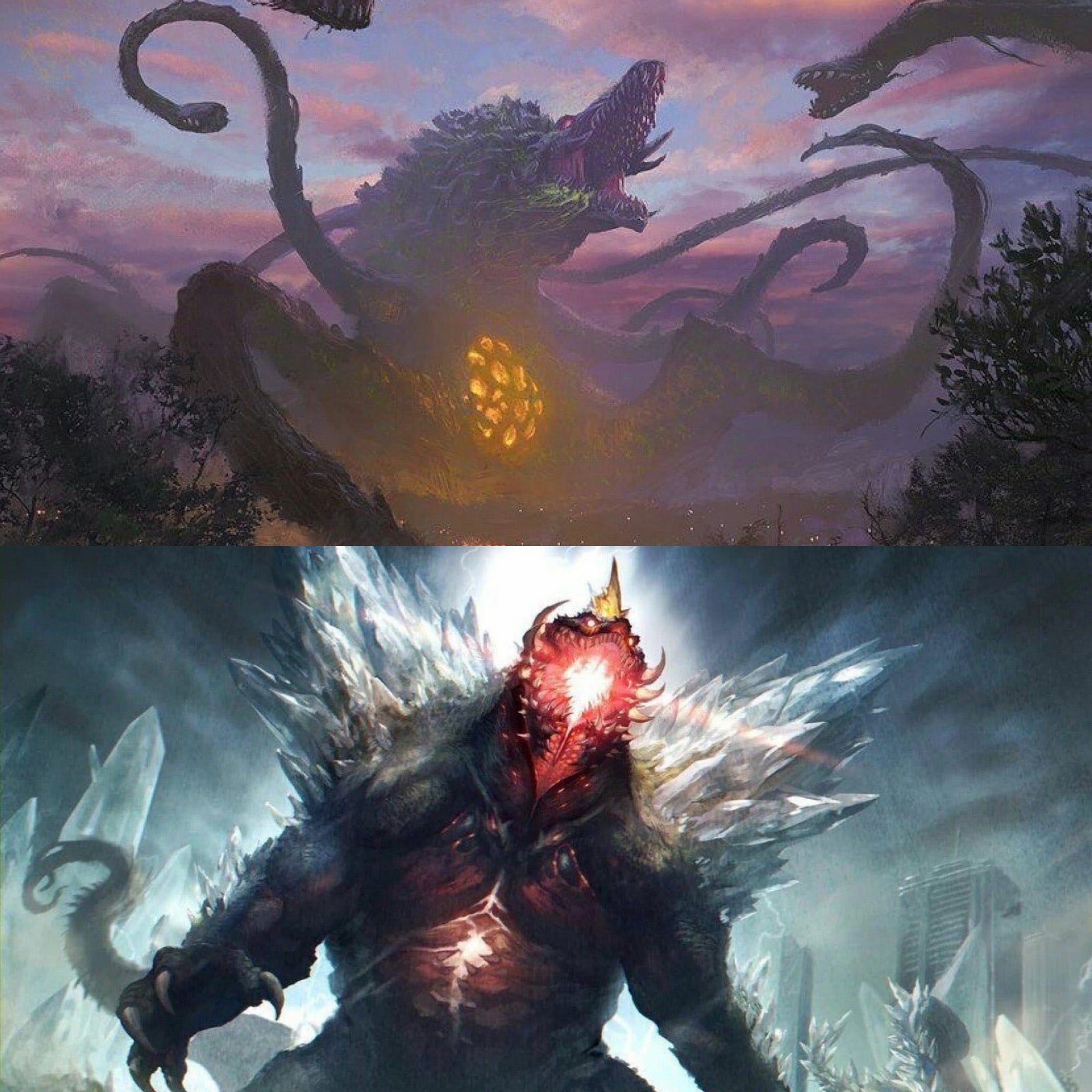
In the 1989 movie Godzilla vs. Biolante, a scientist, in his grief, splices together some cells from his deceased daughter, some of Godzilla’s regenerative cells, and a rosebud for some reason, which gives birth to the plant kaiju Biollante, because that’s science, obviously. Godzilla beats the tar out of Biolante, and throws them into space, but this was a bad decision on Godzilla’s part, as Biollante’s G-cells end up… impregnating a black hole, I guess? The black hole then gives birth to SpaceGodzilla, because, sure, why wouldn’t it? SpaceGodzilla, of course, is trouble, with a capital T that rhymes with G, and that stands for Godzilla. That stands for Godzilla!
Now, while some might view Noriko’s G-cell infection as more of a metaphor for the lingering effects of radiation, not to mention the American bombings, and how this affected Japanese citizens following World War 2, I’m still hoping that we get a “serious” arty-Godzilla version of these two ridiculous monsters.
Fingers crossed.
But while I do generally appreciate these kinds of easter eggs, especially when they appear within a modern day reboot of one of these storied franchises, I also found this film’s nostalgia for the original film, with its many nods and homages throughout the movie, to hamper it somewhat. This was something that took me a while to really put my finger on, but in a way, this film put me in mind of JJ Abram’s Star Wars sequels. I don’t mean Last Jedi, of course, which is a masterful film, but more the two bookends that were directed by Abrams, films that are defined by their cowardice when it comes to forging their own path, by their inability to imagine a story outside of the confines of what has come before, or accomplish anything beyond just highlighting callbacks and homages. This film is nowhere near as bad as that, of course, but it does seem to mostly be interested in recapturing the same feelings that the creators felt when they fist saw a Godzilla as a kid. When compared to the newer vision the film Shin Godzilla presents, Godzilla Minus One just ends up seeming like a rehash of older themes and older iconography. Where Shin Godzilla was a vicious satire of political incompetence inspired by the events surrounding Fukushima, a shrewd dissection of both power and politics, Godzilla Minus One, while a seemingly earnest tale of heroic sacrifice and the power of community, also seems to be asking: “Yeah, but what if being a kamikaze pilot was actually a good thing sometimes?”
And that kind of weird undercurrent of nationalism, that suggestion that the erasure of yourself in the face of the needs of the state, that “patriotic” encouragement to give all of yourself so selflessly in the service of a “pure” institution, that same old message of militaristic nationalism, just wearing a new suit, is… off-putting.
Not that I didn’t embrace it at times myself while watching the film. Many times, in fact. There’s a lot of shit that really works here. It’s exciting and fun. It’s thrilling. It’s touching and sad. There are several moments, like Godzilla’s initial attack on Tokyo, that are frankly incredible. But the overwhelming nostalgia, both for this unattainable recapturing of child-like wonder, as well as this Imperialistic agenda of perseverance, and noble sacrifice, it was like a single discordant note constantly being hit in an otherwise fantastic orchestra.
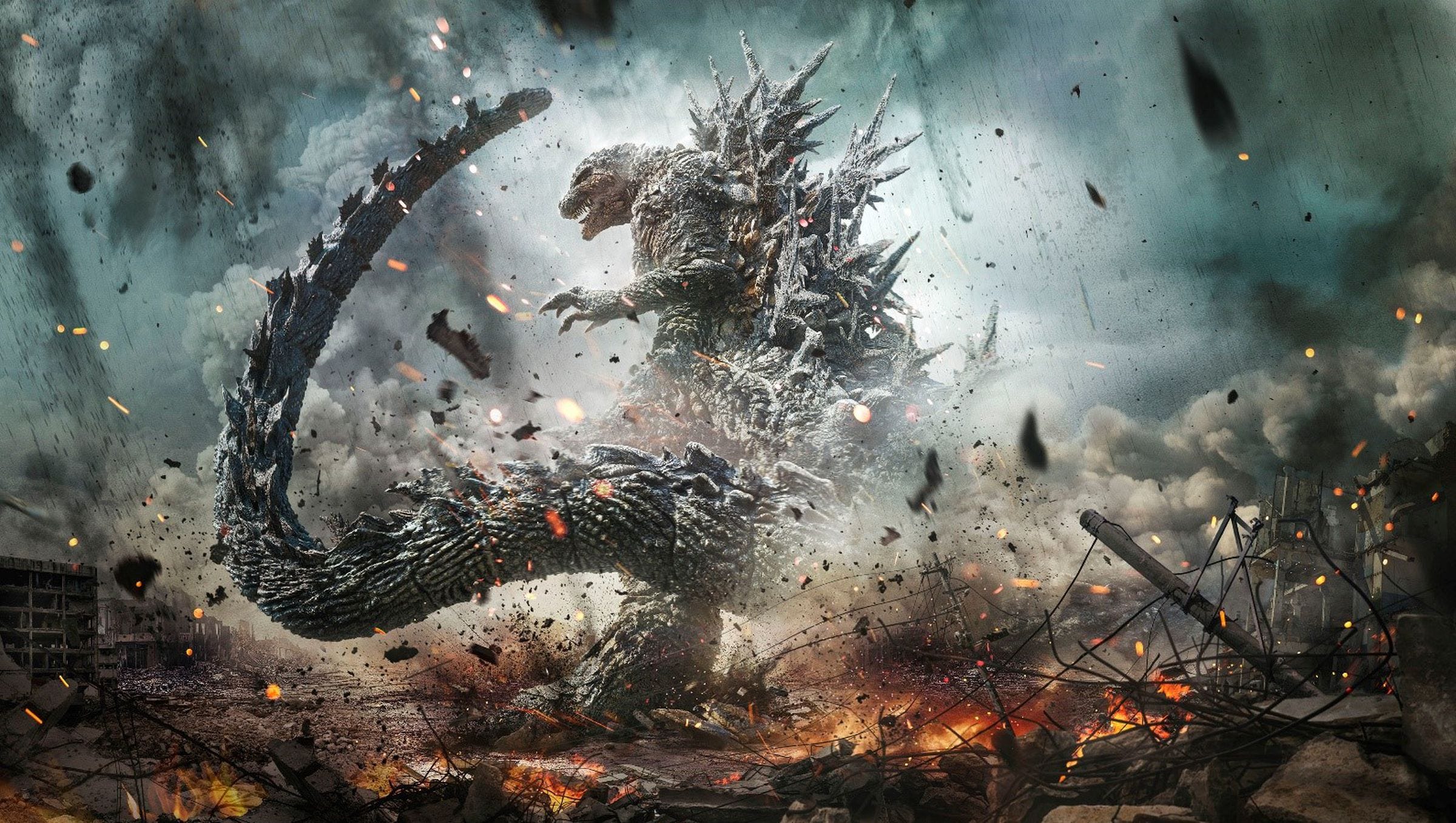
On top of this, the removal of U.S. forces during this time lends an unreality to the whole situation that looms even larger than the central giant monster. It highlights the fantasy, and seems like it was only done to make the story easier for the creators to tell, to better allow for their intended story, the tale of the average man giving nobly of himself for Japan’s future, to happen. As Godzilla is depicted here, it’s basically just a very large and very obvious metaphor for Japan’s defeat in the second World War, and a way to metaphorically win that war a second time around, as these disenfranchised and emasculated war veterans find their honor once again, after having had enough of ineffectual bureaucrats, and deciding to “do the job themselves.”
And yes, obviously I realize that the “job” in question is Godzilla.
But because the “job” is Godzilla, this nationalistic message is able to be framed as just. Still, the fantasy of the giant lizard is a flimsy armor hiding the soft underbelly of the meaning beneath. The veterans in this film are in effect rejecting Japan’s new government, the post-war government, and embracing their old Imperial one, the one that was defeated in WW2, the one that committed many, many, many war crimes. It’s just some jingoistic shit wrapped up in a contrived fantasy, because these giant lizard attacks allow for these soldiers to be portrayed as pure. They’re “good” apples, they’re not “bad” apples. These are men who are simply stepping up when their country has called, and with naught but the noblest of intentions too, and all despite the fact that their country has abandoned them. It’s a weird attempt at pardoning the soldiers who willingly fought for the axis, opting instead for a “just following orders” stance, and instead shifting the blame onto the continually failing government of Japan, and all while seeming to imply at several points in the film that the demilitarization of Japan following WW2 was a mistake. And on top of all that, it is clearly valorizing vigilante violence when it’s done for the “right” reasons, a line of reasoning akin to the ideas pushed by the people who advocate for running over protestors who block the road.
And yes, like I said, I get that they’re fighting a giant monster in this particular case, one who is definitely an immediate threat, but still...
Additionally, the portrayal of the monster is also part of the issue. In order to play up the selfless heroism of the vets, in Godzilla Minus One, the titular monster might as well be a hurricane. Godzilla has no specific reason to attack Japan, other than Japan just happens to be sitting there, waiting for a big lumbering metaphor for the vets to nobly band together against. In Shin Godzilla, the creature is a victim, tortured by its endless mutations, which are caused by its radiation exposure, so it lashes out like a whipped dog. This is more in line with the core message of the kaiju genre: “When we act as if we’re above nature, we’re punished for it.” That’s the tragedy of Shin Godzilla, it’s about how powerless we are in preventing the suffering of others when we push to set ourselves above the natural world. In Godzilla Minus One, there only seems to be a lament for the days of Imperial yore, while railing against what it seems to perceive as undeserved injustices following the 2nd World War.
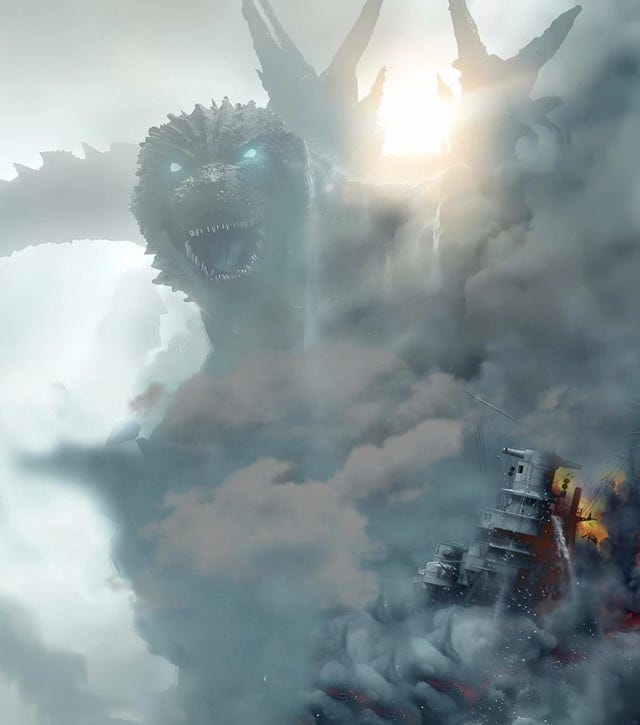
To be fair, this seems to be a minority reaction, seeing Godzilla Minus One as a symbolic re-litigation of the war, with Japan finally triumphing. Many lauded the film for its treatment of post-traumatic stress disorder and survivor’s guilt. It was also praised for being a critique of the machismo that shapes soldiers’ attitudes towards their roles in war.
So maybe it’s just me.
I really did like this film. I did. Just not as much as everyone else out there seems to. And maybe that was due to hearing everyone rave about it for so long, something I usually try to avoid, but sometimes can’t. Maybe that raised my expectations a little too much? Or maybe, the fact that people had to wait for as long as they did for this film to be readily available in America gave everyone who saw the film early a case of “Festival Brain,” that thing that happens at Film Festivals where the experience of getting to see a film special and early, and often first, unduly stains a person’s feelings about the film in question in a maybe somewhat undeservedly positive way? Maybe it was a little from Column A and a little from Column B?
And again, that’s not me saying that this film is bad. It’s not. At all. I really enjoyed it. I did. It’s just that some folks are sincerely saying that Godzilla Minus One is the best film of the year (2023), and I don’t know if it’s anything more than just a pretty good Godzilla movie.
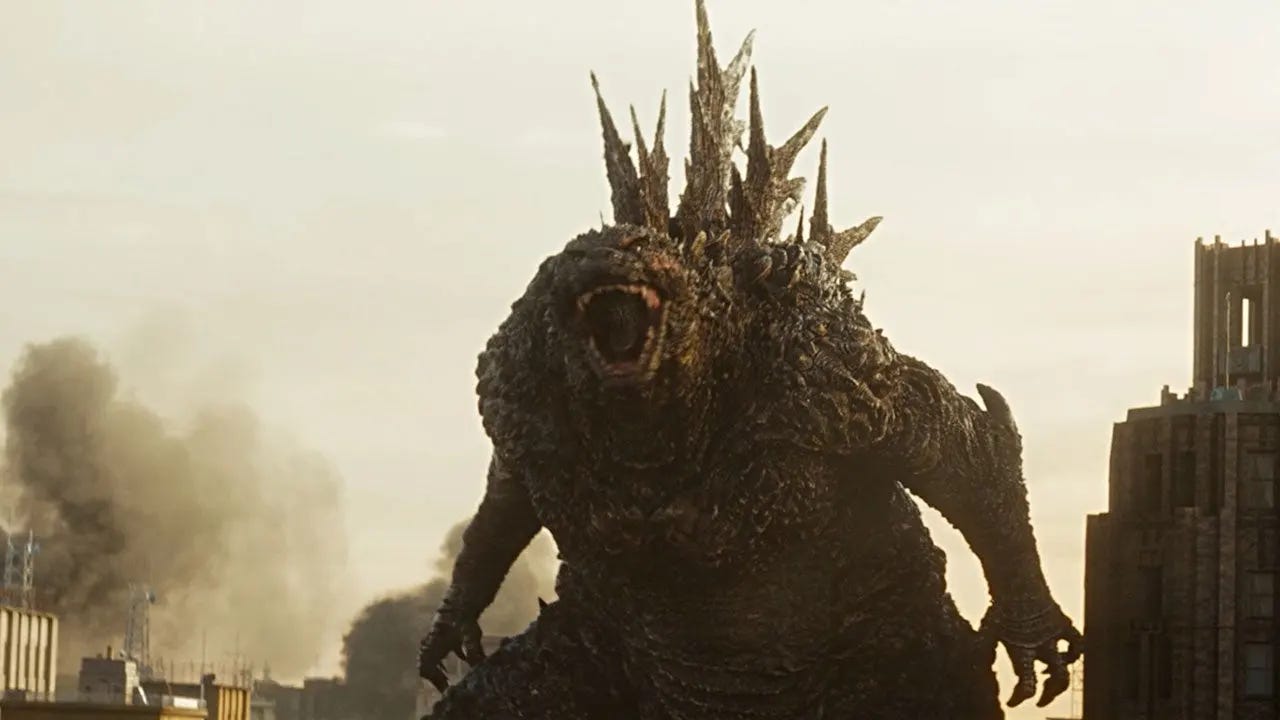
But again, that’s just me. Your mileage may vary.
There’s a lot to like here. This is a good movie. As I mentioned, the effects are pretty incredible, the set pieces are amazing, the story is well-written and bolstered by good performances. I’d like to see more of this world. I also love that we’re living in a world where an American version of Godzilla and a Japanese version of Godzilla are running around simultaneously. In the end, as both an escapist crowd-pleaser and a sobering human-centric tale of the cost of war, Godzilla Minus One is pretty well done film.
I encourage you to check it out and see for yourself.
